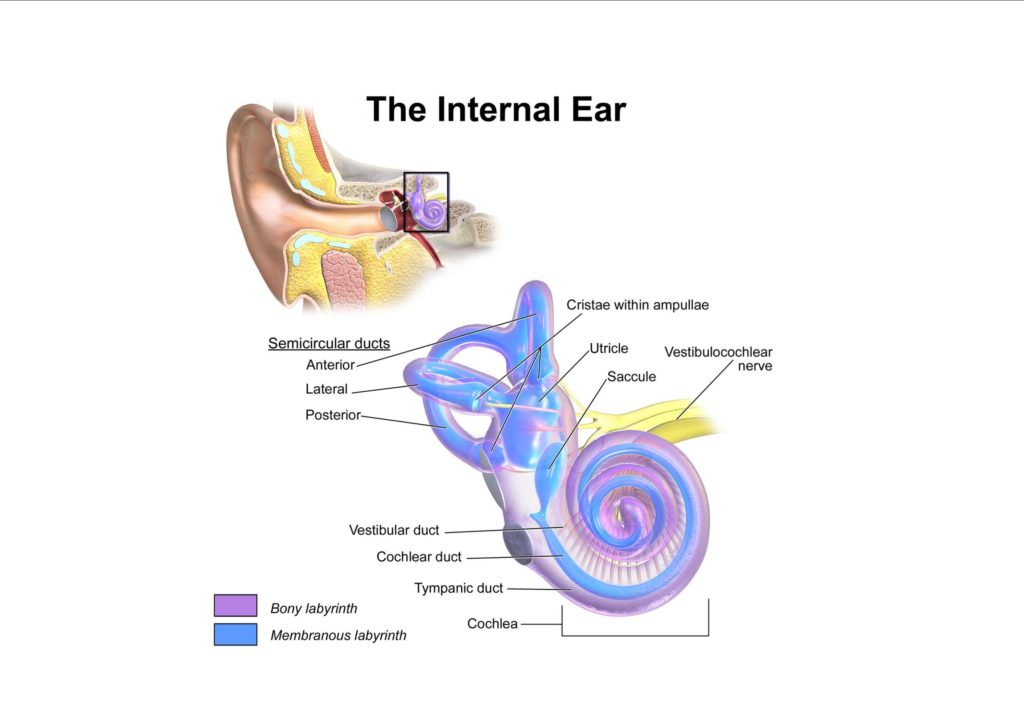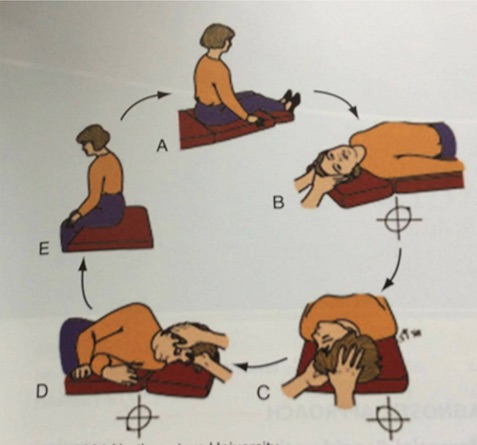The terms ‘vertigo’ and ‘dizziness’ are often used interchangeably. Our Oakville Chiropractic Team can treat both types of vertigo. Both refer to symptoms of feeling uneasy, unbalanced and unpleasant. Vertigo is the sensation that you are spinning, or that the world is spinning around you. It is the sensation that you, or objects around you, are spinning when they are not. Dizziness refers to lightheadedness, faintness and unsteadiness. These symptoms can be caused by a few different conditions, but the most common is BPPV. More can be learned on vertigo and treatment here.
What is Vertigo and BPPV Treatment in Oakville ?
BPPV stands for Benign Paroxysmal Positional Vertigo. Our Oakville Vertigo treatment team says 50 – 60% of all vertigo patients coming into our clinic has BPPV. As the name suggests, this condition is not caused by any scary central nervous system problems – it is benign in nature. However, it causes episodic, sudden and severe episodes of vertigo that can be extremely debilitating. The position of the head and body can trigger these vertigo attacks. BPPV is the most common cause of vertigo. Our Oakville Chiropractors use a combination of complex positions, manual adjustments, at home advice and IFC therapy to help treat BPPV. Dr. Jenn and Dr. Steve see amazing results in less then 5 visits with most patients. If your vertigo started after a head trauma please see our treatment for concussions including acupuncture.
What is the Mechanism of BPPV Vertigo?

The main cause of BPPV is trouble within the inner ear. The inner ear has a very intricate design. Our Oakville Vertigo team says the utricle is a structure that houses small calcium deposits called ‘otoliths’. These otoliths are an important part of our vestibular system. They help our brain determine motion and orientation. In BPPV vertigo these otoliths become displaced from the utricle, and move into the neighboring semicircular canal. These tiny deposits shifting from one structure to another disrupts the delicate balance of the system and results in our head struggling to orient itself, and the sensation of vertigo.
What Causes BPPV Vertigo?
So the next question is naturally “what can cause these calcium deposits to shift and cause BPPV Vertigo?” A few different things can. Our Oakville Team says a head injury (concussion, sports injury, car accident) can result in vertigo symptoms. Any time the head is hit or tossed around, the otoliths can become displaced and result in vertigo.
Rolling over in bed is a common cause of vertigo. It may seem hard to believe, but our head positions while we sleep can often be the perfect positions for those otoliths to move. When we lay down, the position of the crystals changes due to our body position and gravity. Keeping our head in one static position while laying down lets the crystals all gather towards one part of inner ear, and then if we turn/roll over in the night, these crystals can shift into a problematic area that wouldn’t typically be accessible if we were standing up. Makes sense, right?
Barometric pressure can also play a role, and individuals who suffer from vertigo often report that symptoms worsen before a rain or snowfall. Lack of sleep and stress are also known factors that can worsen vertigo symptoms. Individuals who have recently suffered ear infections or from vestibular neuritis, may also be more at risk of developing BPPV.
Symptoms of BPPV Vertigo
- vertigo
- dizziness, light-headedness
- nausea/vomiting
- episodic
- sudden onset,
- short duration (lasting a few seconds to a few minutes)
- attacks triggered by change in position
How is BPPV Vertigo Diagnosed?
Our Oakville chiropractors are well trained to diagnose vertigo and BPPV. A thorough history taking will help rule out other conditions that can cause dizziness and may feel similar to BPPV. The health history exam will consist of questions about headaches, nausea, ringing in the ears, pain, hearing loss, frequency and lengths of attacks, triggers and medications. Our chiropractors will be able to tease out the most likely cause of your vertigo symptoms.
BPPV is the most common cause of vertigo. It can be tested, in clinic, by one simple test called the Dix-Hallpike Test. This test involves quickly maneuvering the head into a position that would trigger a vertigo attack. It involves the patient quickly laying down while the chiropractor guides the head/neck into an extended and slightly rotated position. The chiropractor will watch the patient’s eyes for any sign of nystagmus. Nystagmus is an involuntary twitching movement of the eyes. The hallmark of this condition is that is takes 5-10 seconds for the nystagmus to kick in, and it can last anywhere from 5 seconds to one minute after the test! This test can cause nausea, and in cases where symptoms are severe, even vomiting.
How Is BPPV Treated at our Oakville clinic?
The goal of treatment of BPPV at our Oakville Chiropractic Clinic is to reposition the calcium deposits (otoliths) back into the utricle where they belong. As long as these deposits remain within the semicircular canals, episodic vertigo symptoms will remain.
The most popular treatment is called the Epley Maneuver. This maneuver is designed to move the head in a specific way that helps guide the otoliths back where they belong. This can be performed by your chiropractor at every visit and can also be taught to the patient, so that they can complete this maneuver at home as well.

Due to the fact that the goal of this manoeuvre is the repositioning of the otoliths, maintaining an upright posture for a period of time post-treatment can make the treatment more effective. If you had the Epley Maneouvre done at 5pm, and then went home and went to bed at 9pm, the otoliths would just float right back into the canal. We don’t want that! It is suggested that you sleep sitting up, in a semi-reclined position while undergoing treatment for BPPV in order to make the treatment effective as quickly as possible.
More troublesome Vertigo cases will need a little more time and treatment and can be helped with Acupuncture at our Oakville clinic.
What If My Dizziness Isn’t Caused by BPPV?
Our Oakville Vertigo Treatment Team wants to get the diagnosis right the first time. If our Chiropractors feel they can not help you with your vertigo , they will assist you and your medical doctor in getting the help you need. Low blood sugar and low blood pressure are common conditions that can cause dizziness. Before you completely panic about your dizzy spell, consider these two potential causes!
One of the most common conditions that may be mistaken for BPPV is Meniere’s Disease. This may be due to the fact that they can occur together. Meniere’s differs from BPPV in that it also causes a feeling of fullness in the ear, tinnitus (ringing in the ear) and possible intermittent hearing loss.
Labrythitis is an infection within in the inner ear. It can cause symptoms of dizziness and vertigo, but also is typically assocated with some degree of hearing loss as well.
When symptoms of vertigo and dizziness last longer than a few minutes, other conditions must be considered as well. Vascular issues such as vertebral artery insufficiency, TIA’s and stroke’s can also present with vertigo and dizziness. Our chiropractors are well trained to differentiate between BPPV and the more serious causes of vertigo symptoms. If you are unsure of whats happening, please see your medical doctor or go to hospital immediately.
Cervicogenic Vertigo Treatment Oakville
Cervicogenic vertigo and dizziness is another relatively common cause of dizziness and vertigo-like symptoms. Our Oakville Chiropractors say that 35-50% of Vertigo cases at our clinic are coming from patients necks or cervical spine. These cases are more common in individuals who have suffered a trauma to the head and/or neck (car accident, concussion, sports injury etc). They can also be something as simple as sleeping position, too much ipad or coughing from a cold or flu.
This condition is associated with pain in the neck and pain related to neck movements. Headaches may also be present. Unlike BPPV, cervicogenic dizziness may be brought on by any movement of the cervical spine and less influenced by overall body position. Our vertigo treatment team sees this in patients when they are rolling over to get out of bed or checking their blind spots in the car. Many patients, if not all have a combination of BPPV and Cervicogenic Vertigo.
Treatment For Cervicogenic Dizziness and Vertigo in Oakville
Our chiropractors will help to rule out other causes of dizziness and address the issues of the cervical spine. Spinal manipulation/mobilization will help address stiff, restricted joints and help to restore proper movement between vertebral segments. A healthy neck should move! Any restrictions in the joints can cause pain, limit mobility and potential cause dizziness and vertigo.
Soft tissue release will be used to address tight muscles and stretches will be prescribed to help promote a speedy recovery. Exercises will also be suggested to strengthen the deep musculature of the neck and help prevent re-occurrence of the condition. If you think you might be suffering from BPPV or Cervicogenic Vertigo book an appointment today with our Oakville Vertigo Team.
